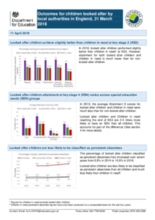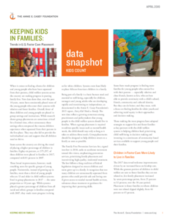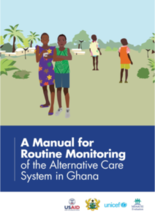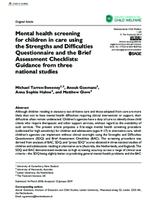Displaying 101 - 110 of 565
The purpose of this chapter from the book Re-Visioning Public Health Approaches for Protecting Children is to document and discuss the conceptual, methodological, ethical, and infrastructure related issues that arise in supporting the research needs of child welfare organizations in Canada in order to implement evidence-based practice models, while providing examples of the usefulness and challenges of using administrative child welfare data to inform policies and programs.
This statistical release provides national and local authority (LA) level information on the outcomes for children who have been looked after continuously for at least 12 months at 31 March 2018, by local authorities in England.
In this data snapshot, the Annie E. Casey Foundation examines how placements for young people in foster care have changed from 2007 to 2017.
As technology enhancements effectively augment family-based interventions, the purpose of this study was to pilot a smartphone application (app) in the context of a trauma and behavior management-informed training for foster and kinship caregivers.
This study assesses the feasibility of hiring coders to abstract the required information from administrative records and case narratives, to inform programs that aim to eradicate child maltreatment (CM) and to provide services to children and families in Canada.
The Opening Doors for Europe’s Children – a pan-European campaign that advocates for strengthening families and ending institutional care – released 16 country fact sheets about the progress with the transition from institutional to family- and community-based care (also known as deinstitutionalisation) in 2018.
The purpose of this manual is to provide guidance on how to collect and report data on children in formal alternative care in Ghana in a standardised way, and to analyse, present, and make the data available for use.
This resource compiles critical data from a variety of sources on children, youth, and families who came in contact with the US child welfare system in federal fiscal year (FY) 2017.
This study examined the predictive power of the Strength and Difficulties Questionnaire (SDQ) for predicting foster placement breakdown.
The present article proposes a first-stage mental health screening procedure (calibrated for high sensitivity) for children and adolescents (ages 4–17) in alternative care, which children’s agencies can implement without clinical oversight using the Strengths and Difficulties Questionnaire (SDQ) and Brief Assessment Checklists (BAC).




